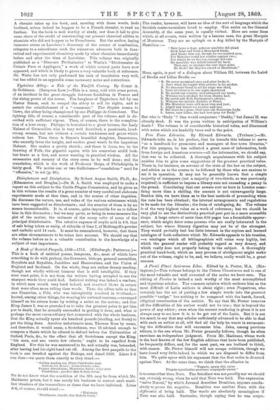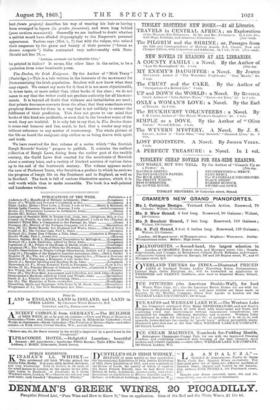A Persii Flacci Satirarum Liber. Edited by A. Pretor, M.A.
(Riv- ingtons.)—This volume belongs to the Catena Classicorum and is one of the most valuable and well executed of the series we have seen. The editing of Persius is indeed a task worthy of the most accomplished and ingenious scholar. The common opinion which reckons him as the most difficult of Latin authors is about right ; even Propertous, who. certainly has the art of putting a few simple words into the greatest possible " tanlge," has nothing to be compared with the harsh, forced, elliptical construction of the satirist. To say that Mr. Prater removes all the difficulties of his author would not be true ; that is beyond the power of any editor ; even when the correct rendering is given it is not always easy to see how it is to be got out of the Latin. But it is not too much to say that any scholar sufficiently advanced.to be able to deal with such an author at all, will find all the help he wants in surmount- ing the difficulties that will encounter him. Jahn, among previous
editors, is the one whom Mr. Proton generally follows, though he often exercises an independent judgment. From Mr. Maclean°, whose work is the best known of the few English editions that have been published, he frequently differs, and, for the most part, we are inclined to think, with reason. Mr. Pretor himself will not escape criticism, though we have found very little indeed in which we are disposed to differ from him. We quite agree with his argument that the first nth° is directed against Nero. At the same time, we think that the allusion in
• Pinguis aqualiculus"pNrournsriog's(situsqnripett eascalvtl " is to some other than Nero. The Scholiast was not possibly nor we should say, certainly wrong, when he said that Nero was bald. The expression "calvo Neroni," by which Juvenal describes Dotaitian, appears conclu- sively to prove the negative. Domitian was another Nero, with the differentia of being bald. The words are absolutely meaningless if 1 Nero was also bald. Snetonins, though saying that he was mina- lent (ventu projecto) describes his way of wearing his hair as having been arranged in layers (in grades formatam), and worn long behind (pone verticem summiserit). Generally we are inclined to doubt whether a satirist would have alluded disparagingly to the Emperor's personal appearance. Tacitus says (Hist. i., 7) that with the vulgar, who valued their emperors by the grace and beauty of their persons ("forma ac decor° corporis ") Galba contrasted very unfavourably with Nero. Should not line 78,— " Autiopa, serumnis ear luctifleabile Puha,"
be printed in italics? It seems, like other lines in the satire, to be a quotation from some bombastic poem.































 Previous page
Previous page